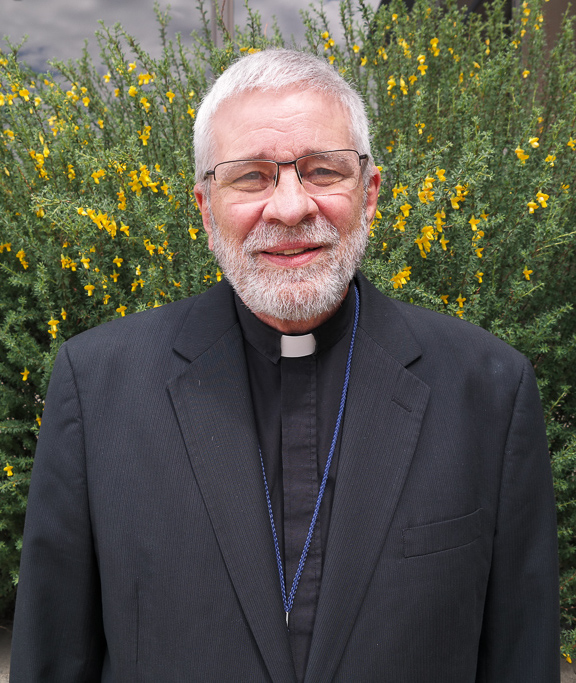Then With Shepherds Let Us Go
 by Timothy Teuscher
by Timothy Teuscher
In the familiar account of the nativity of our Lord from St. Luke’s Gospel, we come across a number of individuals. First and foremost, of course, is the “Babe lying in a manger” (Luke 2:7), our Lord and Saviour, Jesus Christ. Then there are Caesar Augustus, who issued a decree for taxation purposes “that all the world should be registered” (2:1), along with the Roman governor of Syria by the name of Quirinius (2:2); Mary and Joseph who “went up from Galilee to Judea, to the city of David” (2:4); angels who proclaimed Jesus’ birth and sang His praises (2:9); and the shepherds who “were keeping watch over their flock by night” (2:8).
It is among this last group where we are all numbered and find ourselves today, and become participants with them of what took place on that first Christmas many centuries ago. And this is so not just once a year when Christmas rolls around, but in the Divine Service on every Lord’s Day throughout the year.
The heavenly messenger—for that is what the word ‘angel’ means—announced to the shepherds “good news of great joy that will be for all the people” (2:10). This news: “For unto you is born this day in the city of David, a Saviour, who is Christ the Lord” (2:11). The angel is then joined by “a multitude of the heavenly host” (2:13) who break forth into that joyous song of praise: “Glory to God in the highest, and peace to His people on earth” (2:14).
And do you know what? Such still takes place every Lord’s Day in the Service of the Word. We sing that same song of the angels—called in Latin the ‘Gloria in Excelsis’—in anticipation of hearing anew in the appointed Scripture readings and the sermon the same glad tidings of great joy from God’s earthly messenger: the pastor. And this is so whether it be Christmas Eve or the Seventh Sunday after the Epiphany. After all, as Jesus Himself declares: “The Scriptures bear witness about Me” (John 5:39). Or, as St. John puts it: “These are written so that you may believe that Jesus is the Christ, the Son of God, and that by believing you may have life in His name” (John 20:31).
Why, the Service of the Sacrament where we not only go with haste joyfully and frequently to ‘see’ Jesus’ very body and blood lying in and with the bread and the wine, but then even partake of the same.
St. Luke’s account of our Lord’s nativity continues: “And [the shepherds] went with haste and found Mary and Joseph, and the Babe lying in a manger” (Luke 2:16). And so also today. For what comes next in the Divine Service? Why, the Service of the Sacrament where we not only go with haste joyfully and frequently to ‘see’ Jesus’ very body and blood lying in and with the bread and the wine, but then even partake of the same. So, the Lord’s Supper hymn puts it: “The infant Priest was holy born For us unholy and forlorn; From fleshly temple forth came He, Anointed from eternity. The body of God’s Lamb we eat, A priestly food and priestly meat; On sin-parched lips the chalice pours His quenching blood that life restores” (LSB 624:1, 6).
We’re not quite done with the shepherds yet; for as St. Luke continues: “And when they saw it, they made known the saying that had been told them concerning the child” (2:17). And further: “And the shepherds returned, glorifying and praising God for all they had heard and seen, as it had been told them” (2:20).
And so also for us today. “Lord, lettest Thou Thy servant depart in peace,” we sing at the conclusion of the Divine Service. And where do we depart to? Why, like the shepherds we return to our sheep—that is, we go back to our various callings and stations in life no matter how mundane and ordinary they might seem… even if it be working the night shift in the hills outside of Bethlehem (or Calgary, Regina, Kitchener, or elsewhere). Think of the Small Catechism’s ‘Table of Duties’ here: citizens, husbands and wives, parents and children, workers and employers, and so forth. It is in these various callings that we, like the shepherds, glorify and praise God in word and deed, and in the course of which tell others what we too have seen and heard in God’s life-giving Word concerning the Word who became flesh. We speak of our Lord and Saviour, Jesus Christ, so that others, too, might “Come to Bethlehem and see Him whose birth the angels sing. Come, adore on bended knee Christ the Lord, the newborn King” (LSB 368:3)
 “Then with the shepherds let us go To see what God for us has done In sending us His own dear Son” (LSB 358:6). So Martin Luther wrote in one of his Christmas hymns. And not just once a year when Christmas rolls around, but every Lord’s Day. Every time God’s people gather together around His Word and the Sacrament in the Divine Service, it is, in effect, Christmas.
“Then with the shepherds let us go To see what God for us has done In sending us His own dear Son” (LSB 358:6). So Martin Luther wrote in one of his Christmas hymns. And not just once a year when Christmas rolls around, but every Lord’s Day. Every time God’s people gather together around His Word and the Sacrament in the Divine Service, it is, in effect, Christmas.
———————
Rev. Dr. Timothy Teuscher is President of Lutheran Church–Canada (LCC).




